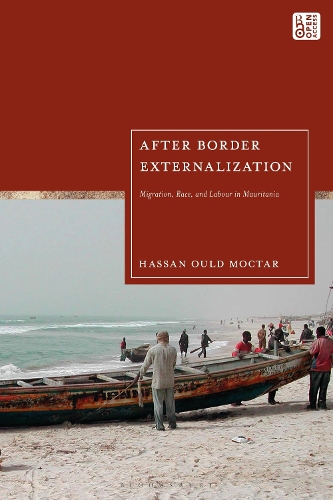
After Border Externalization: Migration, Race, and Labour in Mauritania
(Paperback)
Publishing Details
After Border Externalization: Migration, Race, and Labour in Mauritania
By (Author) Hassan Ould Moctar
Bloomsbury Publishing PLC
Bloomsbury Academic
30th April 2026
United Kingdom
Classifications
Professional and Scholarly
Non Fiction
Colonialism and imperialism
Capitalism
331.62661
Physical Properties
Paperback
232
Width 156mm, Height 234mm
Description
In this open access book, Hassan Ould Moctar offers an original analysis of the European Unions tendency to extend its border and migration control operations into the Global South. Rather than approaching this border externalization in analytical isolation, he details how it relates to history and social relations in the West African state of Mauritania. The political concern with policing irregular migration emerged relatively recently in Mauritania as a result of EU policy cooperation. But as Ould Moctar shows, it intervenes within a deeper historic arc of colonial bordering and racialized population management, while also upholding capitalisms tendency to cast people out of its development. To trace how this plays out in practice, he offers fine-grained ethnographic accounts of the conditions of migrant workers who have come up against the violence of externalisation at various points in their trajectories. By tying these narratives to equally formative experiences of urban informality and rural dispossession, he demonstrates how the EU border regime intervenes within a colonially inherited framework of racialized territorial belonging and capitalisms wasteful dynamics in the Global South.
The ebook editions of this book are available open access under a CC BY-NC-ND 4.0 licence on bloomsburycollections.com. Open access was funded by the Bloomsbury Open Collections Library Collective.
Reviews
After Externalization is an incisive study of migration in Mauritanias borderlands. The book is much more than a study of the effects of European border policies in Africa. Hassan Ould Moctar has a more ambitious goal, to painstakingly investigate the links between migrant illegality, colonial legacies, global capitalism, and security technologies. Along the way, he shows us the twilight of a Eurocentric world order. This book is a rich contribution to our understanding of border politics in the Sahel and beyond. -- Philippe M. Frowd, author of Security at the Borders (2018)
Drawing upon extended ethnographic fieldwork, this is a deeply perceptive and rich account of the impact of EU border externalisation on Mauritania's society, politics, and economy. A powerful corrective to the Eurocentric ways in which borders and migration are so often spoken about today. -- Adam Hanieh, University of Exeter, UK
In this important new addition to the literature on border externalisation, Hassan Ould Moctar offers us a tour de force of how these intricate and intimate multi-scalar practices play out in the context of Mauritania, firmly contextualising externalisation efforts within wider processes of colonialism, racial capitalism, and importantly, opportunities for resistance. -- Polly Pallister-Wilkins, Associate Professor, University of Amsterdam and author of Humanitarian Borders: Unequal Mobility and Saving Lives
Coloniality, racialised exploitation, illegality have become crucial concepts in our understanding of the so-called migration crisis. After Border Externalization takes us onto a journey where these concepts are brought to life, incarnated and situated. Its rich ethnography provides nuance and celebrates ambiguity, elevating Hassan Ould Moctar's sophisticated analytical critique. After Border Externalization charts new and exciting investigative trajectories in the field of Critical Borders and Migration Studies. * Dr Paolo Novak, Co-Director, Centre for Migration and Diaspora Studies, SOAS, UK *
Author Bio
Hassan Ould Moctar is a Lecturer in Social Anthropology, SOAS, University of London, UK.
